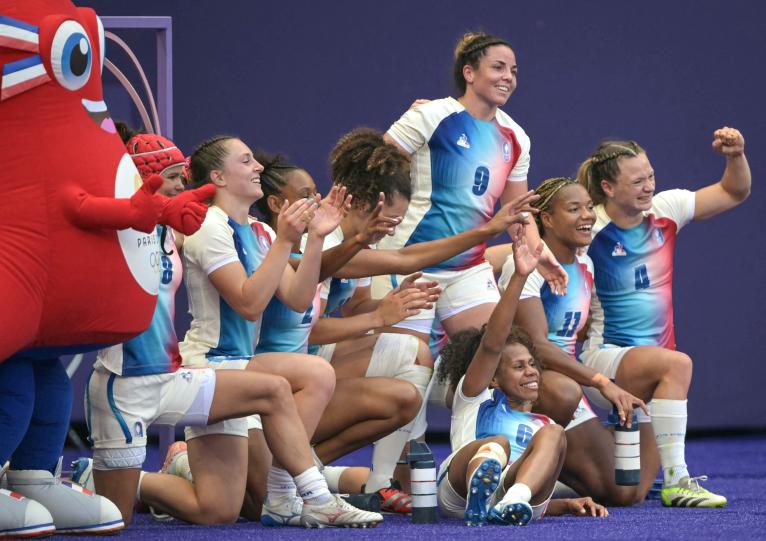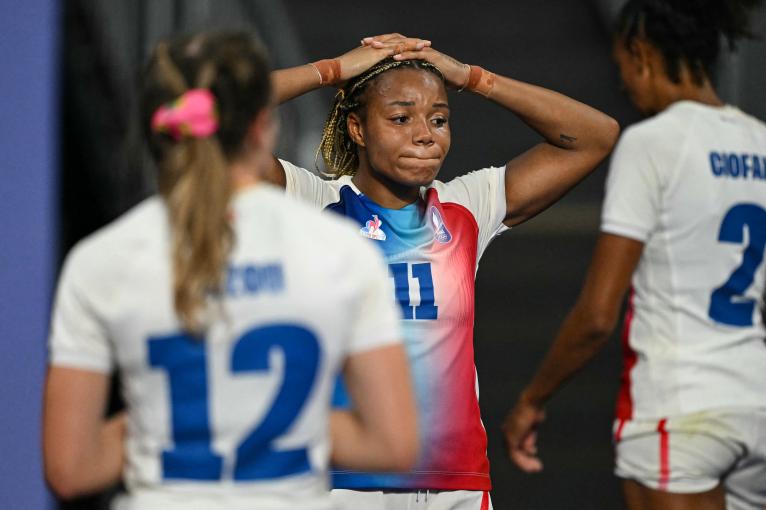David Courteix se relance avec les U20

Alors que France 7 Féminine sait désormais qui est à sa tête – Romain Huet (39 ans), ancien responsable de l’académie olympique, ancien responsable du pôle France féminin et préparateur physique du XV de France féminin – on n’avait plus de nouvelles de David Courteix.
Le technicien avait entraîné l’équipe de France féminine de rugby à sept pendant 14 ans, l’emmenant à la médaille d’argent aux Jeux olympique de Tokyo 2020 (joués en 2021), mais sans jamais gagner un seul titre sur le circuit mondial pendant toutes ces années.
Son mandat s’est terminé abruptement fin juillet avec une triste cinquième place des Bleues à Paris 2024. Dès le dernier match, il quittait son poste.
« C’était acté », confiait-il. Mais la fédération avait d’autres missions à lui proposer : intégrer le staff des moins de 20 ans en plein renouvellement à la suite du départ du manager/entraîneur Sébastien Calvet, parti au SU Agen après être devenu vice-champion du monde en juillet.
Numériquement, Courteix devrait remplacer Philippe Boher (en charge de la défense), parti avec les U20 Développement. Il sera amené à travailler avec le staff du nouvel entraîneur/manager Cédric Laborde dans lequel a été conservé Samuel Cherouk (en charge de la conquête).
« J’ai quitté le monde du sept pour revenir à mes premières amours à XV », a confirmé David Courteix à RugbyPass. Agé de 52 ans aujourd’hui, le natif de Clermont-Ferrand jouait troisième-ligne pour l’ASM Montferrand (1994-2001) puis le Stade Aurillacois (2001-2008) lorsqu’il était joueur. Ce n’est qu’en 2010 qu’il avait repris les rênes de France 7 féminine.
S’il aura plus la charge de la défense, des attitudes au contact et tout ce qui relève de l’attaque avants/trois-quarts – ce que l’on appelle les lancements mixtes – dans les faits, le mode de fonctionnement du nouveau staff sera différent.
« Je ferai des propositions sur certains domaines, tandis qu’en ce qui concerne l’entraînement, on a décidé de ne plus faire d’entraînements spécifiques. Défense, attaque et conquête seront entrainés ensemble », dit-il.
« C’est ça qui me motivait. Car revenir à XV pour être entraîneur spécifique… de toute façon je n’y arriverai pas. »

Lui qui évoquait un « processus (qui) s’approche de celui du deuil » après l’élimination de la France à Paris 2024, n’est pas encore complètement passé à autre chose. « C’est toujours dans un coin de ma tête », admet-il, sans vouloir trop s’étendre sur le sujet.
« Les Jeux ont été une épreuve particulière ; la suite l’est tout autant dans certains domaines », dit-il, énigmatique.
« Je voulais rester à sept parce que le sept était devenu une passion absolue. Je trouve que c’est un rugby plus riche sur le plan tactique, sur le plan de l’adaptation. Revenir au sept un jour, si j’ai l’opportunité, j’en serais ravi. Mais là, c’était bien que je change. »
David Courteix admet qu’il a encore du mal à comprendre comment la France a pu passer à côté de ses Jeux, s’incliner en quart de finale comme elle l’a fait contre le Canada.
« J’ai du mal à analyser », avoue-t-il. « Encore aujourd’hui je ne peux pas m’expliquer. On n’a pas gagné les Jeux parce que, pour être sûr de gagner les Jeux, il faut être très, très, très supérieur et on ne l’était pas.
« Perdre un match, ça arrive. Et je resterais convaincu au fond de moi que ça aurait pu le faire, que c’était pas loin. Je sais aussi qu’un match, ça tient pas à grand-chose. Mais je n’ai pas de reproche. C’est comme ça, c’est le jeu. Les Canadiennes ont bien joué leur partition. A aucun moment on n’a été prétentieux, ni les filles, ni le staff.

« On a eu des opportunités. Ça s’est joué dans la capacité à récupérer le ballon sur laquelle on n’a pas été aussi performantes que d’habitude. Je pense qu’on a été rattrapé par nos démons, quand on a senti que le match se jouait sur un fil…
« Après, il y a le concours de circonstances. On n’a pas tiré sur le fil des circonstances aussi bien que le Canada. On peut dire qu’il y a eu une faute énorme sur le dernier essai ? Mais au rugby, des fautes énormes, on peut en trouver partout ! Elles sont tenues pas le maillot, par les pieds tout le match ? Pour moi, on était prêt à ça, ça n’explique pas.
« On prend deux essais sur mêlée alors qu’on a fait 1000 mêlées en préparation – 500 offensives, 500 défensives. On avait joué le Canada une semaine avant et elles ont fait exactement les mêmes choses.
« Je n’ai pas d’explication. Pour moi il y a surtout ces longues séquences défensives pour remettre la main sur le ballon, obtenir des bras cassés, pour jouer rapidement ce qui était notre jeu. On ne les a pas saisies.
« Quand je regarde les matchs, je ne vois pas de manquement dans la solidarité, je ne vois pas de manquement dans les comportements, dans les attitudes, dans l’implication, dans l’engagement. Peut-être que je nous trouve moins créatifs qu’à l’accoutumée et peut-être c’est là qu’il y a eu un manque. Je nous ai trouvé peu créatifs, en mission, un peu… (il cherche ses mots) classiques, un peu tristounettes.
« J’ai eu du mal à faire le break après. Pour moi, pour les filles surtout, c’était une déception immense. Je n’avais pas envie d’être le meilleur entraineur du monde, j’avais envie d’être l’entraineur de la meilleure équipe du monde, ce n’est pas la même chose. »










































